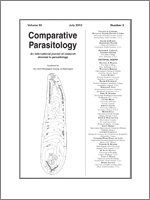Hemolivia mauritanica is an apicomplexan parasite infecting the tortoises Testudo graeca and Testudo marginata as the intermediate vertebrate host, and the tick Hyalomma aegyptium as the definitive invertebrate host. Here, we used molecular techniques to detect an apparent H. mauritanica in the ticks H. aegyptium, attached to Testudo graeca from North Africa. Sequences from 18S rRNA were used to place the new sequences, and others retrieved from GenBank, in a phylogenetic framework. A single Hemolivia haplotype was recovered from 16 ticks. Prevalence was estimated at 22.6% of hosts having ticks infected with H. mauritanica.
How to translate text using browser tools
1 July 2013
Molecular Detection of Hemolivia (Apicomplexa: Haemogregarinidae) from Ticks of North African Testudo graeca (Testudines: Testudinidae) and an Estimation of Their Phylogenetic Relationships Using 18S rRNA Sequences
D. J. Harris,
Eva Graciá,
Fátima Jorge,
Joao P. M. C. Maia,
Ana Perera,
Miguel A. Carretero,
Andrés Giménez
ACCESS THE FULL ARTICLE

Comparative Parasitology
Vol. 80 • No. 2
July 2013
Vol. 80 • No. 2
July 2013
Algeria
arthropod
hemogregarine 18S rRNA gene
Hyalomma aegyptium
Morocco
tortoise
TUNISIA




